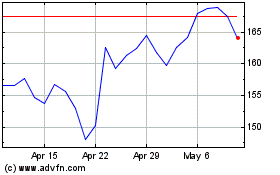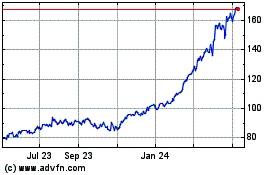By Joshua Jamerson, Andrew Duehren and Natalie Andrews
WASHINGTON -- The Senate approved the largest economic stimulus
package in recent memory, moving the estimated $2 trillion bill to
the House as Congress seeks to give American families and
businesses a financial shield against the ravages of the new
coronavirus pandemic.
Senators approved the legislation after round-the-clock
negotiations between the Trump administration and leading senators.
Following precipitous declines, investors in the past two days have
sent U.S. stocks soaring in anticipation of the bill's passage.
President Trump has said he would sign it immediately.
Steny Hoyer (D., Md.), the House majority leader, said late
Wednesday that the House would consider the stimulus bill on
Friday.
If passed, the new law would provide loans and other
disbursements to a wide swath of the economy, from direct payments
to Americans and loans to large and small companies.
The bill also greatly expands unemployment insurance to cover
freelance and gig workers, refills drained state coffers and
extends additional resources to health-care providers.
"A fight has arrived on our shores," Senate Majority Leader
Mitch McConnell (R., Ky.) said on the Senate floor, where he
likened the measure to "wartime investment." He added: "We did not
seek it. We did not want it. But now, we are going to win it."
Mr. McConnell and Senate Minority Leader Chuck Schumer (D.,
N.Y.) sought to pass the bill swiftly, but passage by unanimous
consent was slowed after rank-and-file members voiced objections
while lawmakers were completing the bill's full text.
Republican lawmakers protested the unemployment provisions in
the bill, and Sen. Bernie Sanders (I., Vt.), a Democratic
presidential candidate, said he would slow the bill if the group of
Republicans didn't withdraw their threat, creating a high-stakes
standoff in the final stages of the negotiations.
Some House Democrats have said the Senate package doesn't go far
enough.
House Speaker Nancy Pelosi (D., Calif.) told reporters Wednesday
that she expects the House to debate the legislation on the floor,
a shift from previous statements in which she said she wanted to
pass it by unanimous consent, a nearly unheard of process for such
a large piece of legislation that could be blocked by one
lawmaker.
"Republicans have told us that's not possible from their side,"
to pass it by unanimous consent, she said. "This is a $2 trillion
bill, I would like to see good debate on the floor."
The House is likely to pass it by a voice vote, where members
call out "Aye" or "No" and not a roll-call vote where names are
recorded. That option allows members who are present to register
dissent, but the bill could still be passed based on a vote of
those in Washington and allow those wary of returning to stay
home.
The legislation will provide one-time checks of $1,200 to
Americans with adjusted gross income up to $75,000 for individuals
and $150,000 for married couples. Individuals and couples are
eligible for an additional $500 per child. The government rebates
will be pared by $5 for each $100 of income over those thresholds,
completely phasing out for individuals whose incomes exceed
$99,000, $146,500 for head of households with one child, and
$198,000 for joint filers who don't have children.
Eligible U.S. residents must have a work-eligible social
security number to receive such a check and must not be claimed as
a dependent by another taxpayer, according to Senate documents.
Unlike an earlier proposal crafted by Senate Republicans, the
payments won't be set at a lower level for some low-income
Americans.
The checks will be available to those who have no income as well
as people who rely on income benefit programs, such as supplemental
security income from the Social Security Administration.
Those payments would be in addition to a broad expansion in
unemployment benefits, which would be extended to nontraditional
employees, including gig workers and freelancers. The agreement is
set to increase current unemployment assistance by $600 a week for
four months.
The legislation hit a snag on Wednesday when a group of Senate
Republicans attempted to amend the legislation to remove the $600
extra weekly payment for those receiving unemployment insurance
because it could result in people getting more money while out of
work than they did in their jobs.
"This bill pays you more not to work than if you were working,"
said Sen. Lindsey Graham (R., S.C.). He, along with a few others,
tried to amend the legislation.
The $600 across-the-board increase was a bipartisan agreement,
reached several days ago and was done because every state has a
different unemployment program and creating a plan for each state
would take too much time, aides from both parties said.
"Some workers, some, may end up coming out ahead. I'm not going
to stand here and say that I feel badly about that," Sen. Dick
Durbin (D., Ill.). "Let's give them that helping hand and not
apologize for it for a minute."
The stimulus package included $350 billion in loans to small
businesses in an effort to keep Americans on payrolls as economic
activity across the country comes to a standstill. Under the new
program, loan money that small businesses use to cover payroll
expenses, rent, interest on mortgage obligations and utilities will
be forgiven. The legislation would also provide billions in debt
relief on existing loans.
A major challenge in the negotiations was $500 billion in
corporate aid, much of which will go toward backstopping Federal
Reserve loans. The Treasury secretary will have the authority to
directly lend a slice of those funds, and Democrats had sought to
place controls on the money. The agreement will create a new
inspector general and oversight board to monitor the aid.
The corporate aid portion also includes $17 billion for
assistance to companies deemed to be crucial to national security,
which could include firms such as Boeing Co. and General Electric
Co.
"You can imagine there's an awful lot of companies that can
qualify for that," Sen. Pat Toomey (R., Pa.) said about that
national-security fund, adding it shouldn't be thought of as
specifically for Boeing.
Boeing has been seeking at least $60 billion in public and
private aid for itself, its suppliers and the broader aerospace
industry.
The legislation also would give grants of $25 billion for
passenger air carriers, $4 billion for air-cargo carriers and $3
billion for contractors. The money is on top of loans and loan
guarantees available through the Treasury. The airlines had sought
such direct grants but initially had been rebuffed by
Republicans.
The legislation will also create a new grant program to send
$100 billion to health-care providers, already straining to respond
to the rising number of infections across the country. An
additional $16 billion will go toward building a stockpile of
medical equipment, including personal protective gear that has
become scarce.
Expanded telehealth, higher Medicare reimbursement for doctors
and hospitals, and a delay in certain Medicaid cuts to hospitals
are part of the coronavirus package focused on health-care needs
during the crisis.
The package would ensure states can get a 6.2% increase in
matching federal funds for Medicaid and delay scheduled reductions
to hospitals that care for a large share of uninsured or low-income
patients. Payments hospitals get for treating patients infected
with the virus would also be increased by 20%.
Democrats said the bill includes $150 billion to go directly to
state and local governments saddled with costs related to the
virus.
In a heated call with House lawmakers from his home state, New
York Gov. Andrew Cuomo said that the state would get only $4
billion in direct aid as part of a package giving $150 billion to
states, according to a person familiar with the call. He argued
that state funding should be higher and that a separate pool of
money in addition to direct state aid should be available for
cities, given that deaths in New York City alone account for about
a quarter of the country's total. Under the bill, any money sought
by an individual city would reduce the amount available to the rest
of the state.
Democrats also secured a provision that bans businesses
controlled by Mr. Trump, the vice president, members of Congress
and heads of executive departments from receiving loans or other
funds from the stimulus bill. Children and spouses of those people
are also banned, according to a senior Democratic aide.
Richard Rubin, Siobhan Hughes and Stephanie Armour contributed
to this article.
Write to Joshua Jamerson at joshua.jamerson@wsj.com, Andrew
Duehren at andrew.duehren@wsj.com and Natalie Andrews at
Natalie.Andrews@wsj.com
(END) Dow Jones Newswires
March 26, 2020 00:05 ET (04:05 GMT)
Copyright (c) 2020 Dow Jones & Company, Inc.
GE Aerospace (NYSE:GE)
Historical Stock Chart
From Mar 2024 to Apr 2024

GE Aerospace (NYSE:GE)
Historical Stock Chart
From Apr 2023 to Apr 2024
